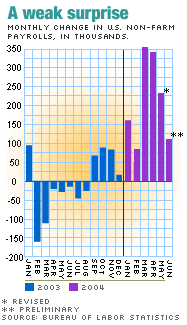NEW YORK (CNN/Money) -
The number of job cuts planned by U.S. employers rose in July, while hiring announcements fell for the second straight month, an outplacement firm said Tuesday.
The report came just days before the government's critical gauges of unemployment and job growth in July, but did little to clarify how strong those measures would be.
U.S. businesses announced 69,572 job cuts in July, up from 64,343 job cuts in June, a gain of 8 percent, according to Chicago-based Challenger, Gray & Christmas, which keeps track of monthly job-cut announcements.
July's announcements were 18 percent lower than those of July 2003, when 85,117 cuts were announced.
The number of new hires announced fell 30 percent to 26,880 from 38,377 in June. There were 55,307 new jobs announced in May, the first month in which Challenger began tracking hiring figures.
"There may be more hiring going on than our numbers suggest, since hiring announcements are not as common as job-cut announcements," Rick Cobb, executive vice president of Challenger, Gray & Christmas, said in a release. "However, the decline in hiring that we are seeing, combined with continued downsizing, indicates that the job market is still struggling to gain momentum."

The job-cut announcements that Challenger tracks include plans to let workers take early retirement. Many of the announced job cuts don't take place in the month they're announced, but several months later.
Challenger's job-cut announcement tally is also not seasonally adjusted. It was not clear what seasonal factors, if any, affected July cuts this year, and different economists drew different conclusions from the data.
"Layoffs typically rise between June and July on account of auto plant shutdowns for retooling purposes," economist Haseeb Ahmed wrote in a note at Economy.com. "In fact, the historic pattern of change between June and July suggested an even sharper increase; thus, a crude seasonal adjustment process based on historical averages alone would show a decline in layoffs."
Robert Brusca, chief economist at Fact & Opinion Economics, compared this year's job-cut announcements to those of previous years and found that the level of cuts is almost exactly midway between the level during the 2001 recession and the level before it.
But he also found that this July's job-cut number was the fourth-highest in the past decade.
"There is not much progress signaled here," Brusca said.
Job rebound in store?
The U.S. labor market has only recently ended what was, by many measures, its worst slump since the Great Depression. Though employers outside the farm sector have added some 1.3 million jobs to payrolls since the beginning of the year, the level of employment in the nation is still 1.2 million jobs lower than it was in March 2001, when the slump began.
Non-farm payrolls grew by an unexpectedly low 112,000 jobs in June, according to a recent Labor Department report, but economists have been hoping job creation rebounded in July.
On Friday, the Labor Department is scheduled to report on July unemployment and non-farm payroll growth. Economists, on average, expect the jobless rate to hold steady at 5.6 percent and for about 243,000 new jobs to have been created, according to Briefing.com.
"June's [payroll] figures appear to have been held back by unseasonably wet weather, President Reagan's funeral, and a relatively short period between the May and June surveys," Wachovia Securities economists wrote in a note to clients on Tuesday. "July could be a make-up month and could see extraordinary gains."
Other recent measures of labor-market health have been mixed. The July consumer confidence survey by the Conference Board, a private research firm, showed consumers believed jobs were somewhat easier to find. The number of new weekly claims for unemployment benefits has held steady at a fairly low level for several weeks.
But the Conference Board's "help wanted" index, which tracks employment ads in major newspapers, fell in July, and the Institute for Supply Management said Monday that purchasing managers reported slightly less hiring in the factory sector.
Manpower Inc. (MAN: Research, Estimates), the world's No. 2 employment firm, said earlier this month that employers still seemed cautious about hiring.
Continued robust job creation could be critical to helping the re-election chances of President Bush, who faces the prospect of becoming the first president since Herbert Hoover to end a full term with net job losses.
In its report, Challenger said the election could be affecting hiring plans.
"Some employers may be waiting to see how the election plays out before going ahead with hiring plans," Cobb wrote. "In fact, in our recent survey, a surprisingly high 43 percent of human resource executives said their hiring plans could be altered based on the election's outcome."

|

